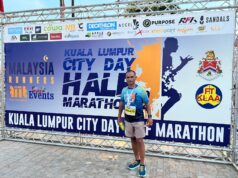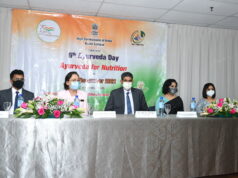 New Delhi, November 12 – From a western perspective, insomnia may arise as a result of depression, stress, breathing issues, or a host of other issues. Treating the symptoms of insomnia may not address the underlying cause. Acupuncture is a holistic medicine that addresses both the symptoms in this case, poor sleep- as well as the underlying cause of the symptoms.
New Delhi, November 12 – From a western perspective, insomnia may arise as a result of depression, stress, breathing issues, or a host of other issues. Treating the symptoms of insomnia may not address the underlying cause. Acupuncture is a holistic medicine that addresses both the symptoms in this case, poor sleep- as well as the underlying cause of the symptoms.
Acupuncture works by normalizing the body’s energy ( or Qi) and restoring balance to the body systems. According to Chinese medicine, insomnia occurs when an individual’s energy becomes stuck in the outside layers of the body.
This may happen for a variety of reason, including overwork, stress, chronic illness, emotional issues, dietary choices, and organ pathology. In order to sleep, our energy must draw into the deepest part of our body. But when the energy stays on the exterior, the eyes cannot comfortably close, the mind stays active, and sleep will either be restless or incomplete.
Many people who experience insomnia find that their sleep disturbances follow specific patterns. For instance, an individual will sleep fine until exactly 2 am every morning, and then stay wide awake for three more hours before fitfully falling back asleep.
This is easily understood in Chinese medicine terms because the energy within our bodies follows patterns that correspond to the times of the day. A person experiencing sleep disturbances that follow time patterns is simply reflecting internal energetic disruptions.
Acupuncture normalizes these disruptions, and helps the energy return to the interior of the body during nighttime hours. As a practicing acupuncturist, I have observed patients with insomnia experience relief of their symptoms with acupuncture. Many doctors prescribe sedative-hypnotic drugs.
According to a recent CNN report, nearly half of all Americans have difficulty sleeping! Another 15% of the general population suffers with chronic insomnia. Lack of sleep has far worse health implications that fatigue or irritability the next day.
The body uses time spent sleeping to perform many crucial regenerative, detoxifying processes. Chronic insomnia is associated with a wide range of adverse consequences including depression, anxiety, alcohol abuse, poor concentration and memory, increased risk for accidental injury, decreased work productivity, increased risk for diabetes and cardiovascular disease, accelerated aging, weight gain and gastrointestinal disease.
They are extremely difficult to discontinue, and cause rebound insomnia. Adrenal deregulation is very common in our society today, and this can result in elevation of the stress hormone cortisol.
Cortisol in the evening prevents restful sleep and cause abdominal adiposity. Lowered levels of melatonin and other hormones can also cause debilitating insomnia. Stress, anxiety, menopause, pain, depression, physical disease and other imbalances can all contribute to insomnia.
Acupuncture directly influences the nervous system, decreases stress, balances adrenal function, and promotes relaxation. Insomnia is a frequent problem in the traumatic brain injury (TBI) population. Sleep disturbances can appear as soon as 24 hours following injury and can continue for several years. Several studies of individuals with TBI in both inpatient and outpatient settings suggest that 30% to 81% of survivors experience sleep difficulties.
 Insomnia can be clinically defined as the occurrence of trouble sleeping characterized by (a) difficulty falling asleep (i.e. , requiring more than 30 minutes to get to sleep) and/or difficulty maintaining sleep (ie, more than 30 minutes to nocturnal awakening), which (b) occurs at least 3 nights per week, and (c) results in impairment in daytime functioning.
Insomnia can be clinically defined as the occurrence of trouble sleeping characterized by (a) difficulty falling asleep (i.e. , requiring more than 30 minutes to get to sleep) and/or difficulty maintaining sleep (ie, more than 30 minutes to nocturnal awakening), which (b) occurs at least 3 nights per week, and (c) results in impairment in daytime functioning.
It is likely that the mechanisms and/or factors involved in the development of insomnia are different in the TBI population than in non-brain-injured individuals. “During the acute stage, dysregulation of sleep seems to be a function of the diffuse disruption of cerebral functioning in the wake of both direct physical damage to the brain and secondary neuropathological events.
As the brain undergoes repair and recovery, including reorganization via mechanisms such as adaptive plasticity, the neuroanatomical mechanisms underlying insomnia in the early post acute stage probably become less significant, behavioral and affective factors are likely to become more prevalent.
There is clearly a need to address sleep disturbance, given its potentially significant impact on the course of recovery from TBI. In particular, fatigue, mood disturbance, and cognitive deficits ( speed of processing, attention, concentration, learning, memory, and executive functions), all impairments typically seen in patients with TBI, are also recognized consequences of insomnia.
Current treatment for insomnia consists primarily of behavioral modification and pharmacotherapy. Unfortunately, these agents are associated with undesirable adverse effects, which are likely to be particularly onerous in the TBI population: daytime somnolence, impairment in memory, psychomotor impairment, rebound insomnia, and lowering of the seizure threshold.
Furthermore, in addition to the short-term consequences these adverse effects may have in impairing a patient’s ability to optimally participate in a rehabilitation program , the central nervous system depressant effects of these medications may have long-term deleterious consequences for neural plasticity, and therefore on the ultimate degree of recovery post-TBI.
Acupuncture holds appeal because of its established efficacy in treating insomnia in other populations, its relative accessibility, and its favourable adverse-effect profile. Acupuncture refers to the technique of penetrating the skin with thin, solid, metallic needles that are manipulated by the hands or by electrical stimulation.
In the Chinese medicine paradigm, the human body is viewed as a microcosmic reflection of the universe. Health and illness are consequences of the state of balance or imbalance of smoothly flowing vital energy of the body known as “Qi”.
From a western medical perspective, needling acupuncture points stimulates the neurohumeral system to release hormones and neuropeptides in the muscles, spinal cord, and brain. These chemical mediators either change the experience of pain, or they trigger the release of other chemicals and hormones, which influence the body’s internal regulating system.
The use of acupuncture for the treatment of insomnia is well-characterized in the medical literature and specific points known to influence insomnia are established in both the Chinese and western medical literature.
 Acupuncture using auricular meridian points is equivalent to the use of tranquilizers and sedation. Further, there are no associated adverse effects, drug dependence, or habit formation.
Acupuncture using auricular meridian points is equivalent to the use of tranquilizers and sedation. Further, there are no associated adverse effects, drug dependence, or habit formation.
Another recent study demonstrated that 5 weeks of acupuncture treatment, provided twice weekly resulted in a statistically significant increase in nocturnal endogenous melatonin secretion and improved sleep onset latency, arousal index, total sleep time, and sleep efficiency. Anxiety and depression were also significantly reduced, as measured by the Trait Anxiety scale.
The enrolled participants included 24 people with TBI within 5 years of study entry and complaints of insomnia, of the 31 individuals who volunteered for the study. Acupuncture point selection was based on the classically described energetic qualities of given acupuncture points and further informed by review of recent Western medical literature describing a positive treatment effect with acupuncture for management of insomnia.
Needles was placed bilaterally ; ear points were placed on only one ear or the other. This needle regimen was known as the “standard dose” formulation. Each acupuncture treatment lasted approximately 20 minutes and utilized the earlier-described standard dose” acupuncture protocol.
If necessary , a “higher dose” protocol or a “lower does” protocol was available, depending on the participant’s response to the treatment. At the conclusion of the study period, all participants were again given an Actigraph and instructed to wear it continually for 72 hours.
-INDIA TODAY










